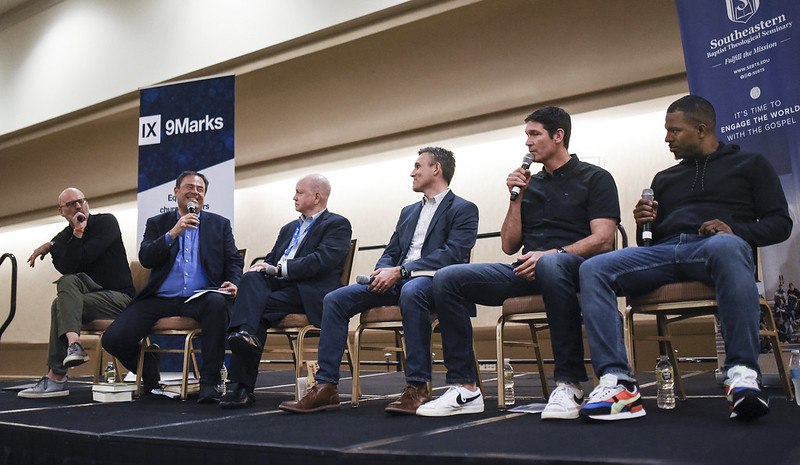
ANAHEIM, Calif. (BP) – A candid conversation about the problems facing Southern Baptist churches and a discussion on the role of denominations headlined both 9Marks panel events coinciding with the 2022 SBC Annual Meeting.

Taking place at 9 p.m. Monday and Tuesday June 13 and 14, the events featured several SBC pastors and entity leaders as well as leaders of 9Marks, a parachurch organization focused on what it deems are the biblical marks of a healthy church.
Panel events included 9Marks President Mark Dever, senior pastor of Capitol Hill Baptist Church in Washington, D.C., and Jonathan Leeman, editorial director of 9 Marks.
Other guests included Matt Chandler, lead pastor of The Village Church in Flower Mound, Texas, Omar Johnson, pastor of Temple Hills Baptist Church in Temple Hills, Md. and Danny Akin, president of Southeastern Baptist Theological Seminary.
Dever opened Monday night’s panel by challenging churches coming to the annual meeting to examine the problems they find within the SBC from their own perspective.
“The problem is most Baptists today have forgotten what it means to be Baptist,” Dever said. “We have to examine what has relaxed our grip on the truths that would serve us so well in times like this, that having lost we are in such trouble. We are even eating each other up as a convention in part because of all the infections that have spread within our churches because they are so sick.
“We who are inerrantists have a tendency to attack entities like they are the problems. We can come to the convention and throw all the stones we want at entity heads and feel very good about ourselves, but brothers it is in the churches that the real battle against sin is fought. Entities are not unimportant, but the IMB and NAMB will always be a reflection of our churches in America. If there is anything you do not like in the IMB or NAMB, look in the mirror and then see if you’re building friendships with pastors in your local area.”
The remainder of Monday night’s panel, moderated by Leeman, featured various guest pastors discussing theological or practical issues they see in the SBC.
Leeman closed the night by talking about several troubling elements of SBC culture that may need some examination. He listed an overly honorific culture regarding leaders, pastors’ inability to receive constructive criticism and a focus on numbers rather than names.
During Tuesday night’s session, the focus shifted to a brief recap of the day’s events, followed by a discussion on the role of denominations.
Guest panelists were asked to describe the state of the SBC in one word, and answers ranged from “mixed” to “divided” to “shaky.”
Danny Akin provided a slightly different answer than the rest as he said “hopeful.” Despite the issues facing the convention, Akin said he feels good about the future of the SBC.
“I would have never thought 10 years ago we would be where we are today having the types of conversations that we’re having …,” he said. “Social media has not been our friend.
“The reason I am hopeful is Southern Baptists have this unbelievable ability under God’s grace, to usually wind up at the right place, though we never get there in a straight line. I believe that’s true when it comes to international missions, North American church planting and I know it’s true of our six seminaries.”
Dever echoed this sentiment later in the panel, saying he is “excited,” for what could be coming in the convention’s future.
“I can’t help but just see a lot of good things,” Dever said. “I think as a convention we essentially just do whatever we think is consistent with Scripture and helps us pastor local churches. So, I’m kind of excited to see what might happens that ends up being good.”
















